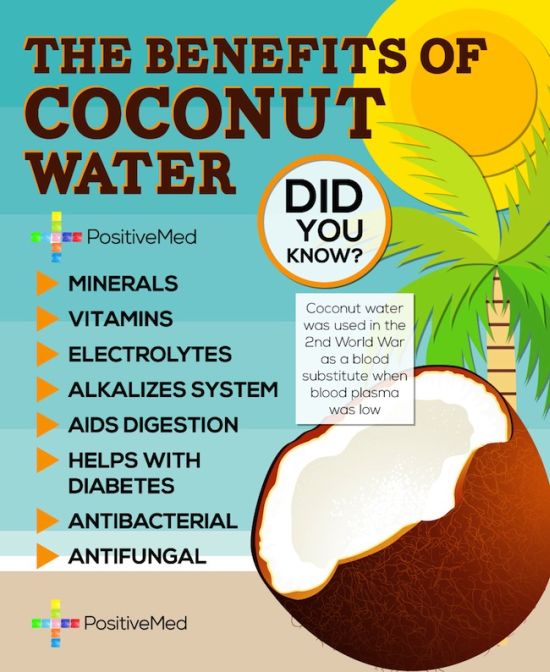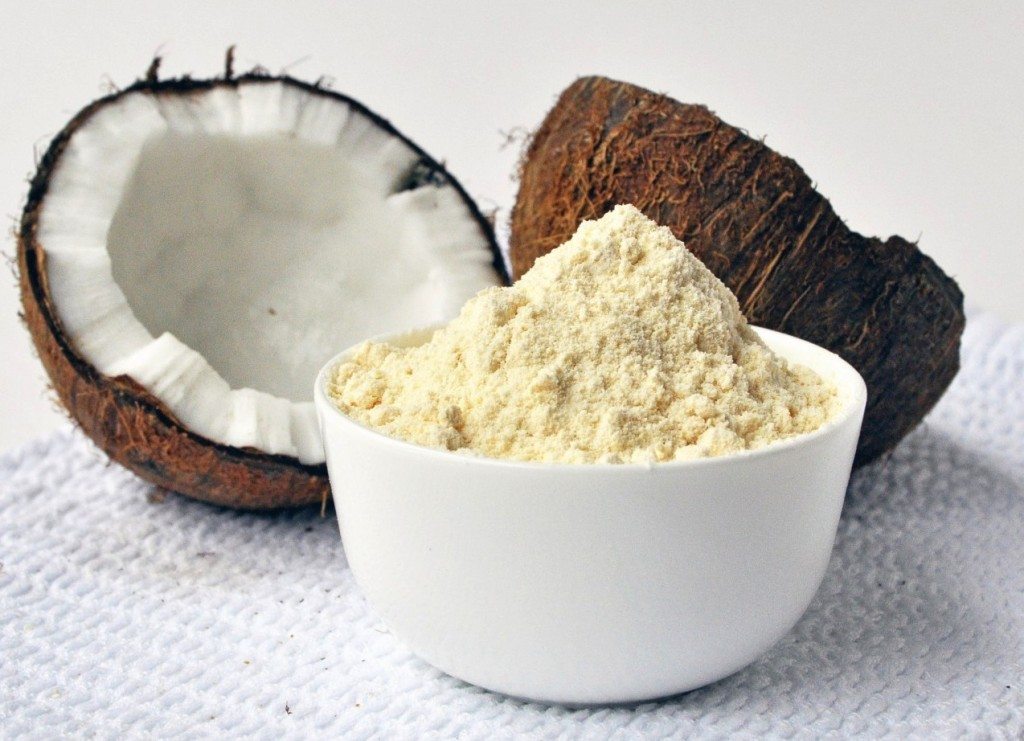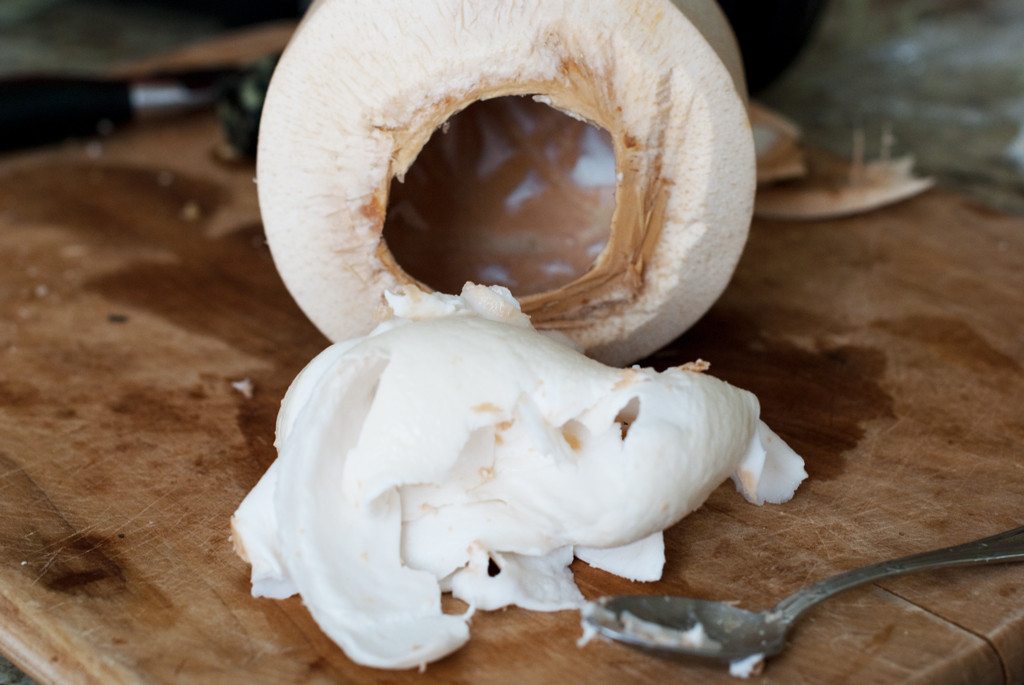The Health Benefits of Coconut: Oil, Milk, Water, Flour & More
The Health Benefits of Coconut: Coconut Oil, Coconut Milk, Coconut Water, Coconut Flour & More

A look at the health benefits of coconut oil, coconut milk, coconut water, coconut flour, plus how to cook with coconut and work coconut into your livity.
The popularity of coconut doesn’t end with hot-right-now coconut water. A variety of coconut-derived ingredients—from coconut oil to coconut flour and coconut milk—are increasingly being used in home kitchens, restaurants and packaged foods. But can a food so rich in calories and laden with saturated fat be healthy? Here are the health benefits and cons of coconut oil, coconut milk, coconut flour, coconut water, coconut meat and coconut flakes.
Health Benefits of Coconut Oil and Cooking Uses for Coconut Oil
Coconut oil was once a heart-health “don’t” thanks to its 87 percent saturated-fat content. Solid at room temperature, it’s making a comeback in some packaged foods and for cooking and baking. While it may be marketed as helpful for cholesterol levels, some nutrition experts disagree about the health benefits of coconut oil. “Coconut oil contains a mixture of saturated fatty acids, some of which don’t adversely affect cholesterol levels,” says Joy Dubost, Ph.D., R.D., a spokesperson for the Academy of Nutrition and Dietetics. “But while its predominant saturated fat —lauric acid—does raise beneficial HDL cholesterol, it also raises harmful LDL cholesterol, which can increase the risk of heart disease.” Look for coconut oil, in jars or tubs, near other cooking oils in large supermarkets, in the natural-foods section, or in natural-foods stores. Wondering how to cook with coconut oil? Replace healthy coconut-oil in your favorite recipe for like muffins, you can use coconut oil sparingly, in place of butter or other oils.
Health Benefits of Coconut Milk and How to Cook with Coconut Milk
Coconut milk is made from a brew of coconut meat and water. But don’t confuse it with lower-calorie coconut water. Rich and thick and more like cream than milk, coconut milk packs an eye-opening 445 calories and 48 grams of fat (43 grams saturated) per cup. That’s where “lite” coconut milk comes in: you can substitute “lite” coconut milk for traditional coconut milk to trim roughly two-thirds the fat and calories without sacrificing flavor, as we do in our healthy coconut-milk recipe for Coconut-Milk Chicken Curry.
Health Benefits of Coconut Water and How to Make Drinks with Coconut Water
Coconut water has gotten a lot of buzz for its purported health benefit as a “natural” sports drink. It is a great hydrator for light workouts, as 1 cup serves up more than 10 percent of your daily dose of potassium—an electrolyte you lose through sweat.
(Just be mindful that 8 ounces of coconut water delivers 45 calories.) But it won’t do the job if you’re sweating up a storm. Why? When we sweat we lose up to 10 times more sodium than potassium. And coconut water only contains about 30 mg of sodium per cup, whereas sports drinks usually deliver about 110 mg. In your market, look for coconut water without added sugar in the refrigerated section near other flavored waters or near shelf-stable waters and natural fruit juices. You can use coconut water in smoothies, as we do in our healthy recipe for Creamsicle Breakfast Smoothie.
Health Benefits of Coconut Flour and How to Bake and Cook with Coconut Flour
Coconut flour is a healthy way to add decadent coconut flavor to baked goods. As for health benefits of coconut flour: it packs a whopping 5 grams of fiber per 2 tablespoons (with only 2 grams of total and saturated fat). Coconut flour has health benefits for people with diabetes, too: adding coconut flour to baked goods lowers the glycemic index (a measure of the rate that a food increases blood sugar). In your market, look for coconut flour near other gluten-free flours.
Health Benefits of Coconut Meat and How to Cook with Coconut Meat
Once the outer green husk of the coconut is removed, what remains is the seed and its rich inner white lining, the coconut meat. If you’re eating a low-carb diet, you’ll be happy to know each 2-by-2-inch piece of raw fresh coconut meat contains only about 7 grams of carbohydrate (less than a third of what you’d get from a medium apple) and is jammed with 4 grams of fiber (16 percent of your daily dose). On the flip side, coconut meat is the nutritional opposite of what you’d expect from a fruit: what it lacks in carbohydrates, it makes up for in fat with 15 grams of fat per 2-inch chunk of coconut, most of which is unhealthy saturated fat. Another reason to not eat coconut meat with abandon: that little piece sports 160 calories.
Coconut meat comes in several forms. You can get it from a fresh whole coconut or dried and flaked coconut comes from the meat. There’s also jarred coconut meat, which is solid at temperatures below 76°F, and is also known as coconut manna or coconut butter. Coconut butter is made from finely ground whole coconut meat and has the texture of natural peanut butter. Coconut butter can be found in jars near other nut butters, baking oils and sometimes even in the supplement department of natural-foods stores and well-stocked supermarkets. We’ve healthfully incorporated jarred coconut meat into recipes for Banana-Coconut Dairy-Free Ice Cream.
Dried Shredded Coconut / Unsweetened Coconut Flakes
While fresh coconut meat is nutritionally superior (it contains more water, which dilutes the fat and calories), prepackaged dried flaked coconut or dried shredded coconut is the most convenient to cook or bake with. Choose unsweetened dried shredded coconut or coconut flakes over sweetened dried coconut, which has 2 teaspoons added sugar per ounce.
To toast dried shredded coconut or dried coconut flakes, cook in a small dry skillet over medium-low heat, stirring constantly, until fragrant and lightly browned, 2 to 5 minutes or spread in a shallow baking dish and bake at 350 degrees until light golden and fragrant, 5 to 10 minutes. You can use dried shredded coconut or coconut flakes in cooking and baking, in many healthy recipes.
How to Toast Coconut
 Large thin flakes of dried coconut called coconut chips make attractive garnishes.
Large thin flakes of dried coconut called coconut chips make attractive garnishes.
1) Cook in a small dry skillet over medium-low heat, stirring constantly, until fragrant and lightly browned, 2 to 5 minutes.
Source: Eating Well








